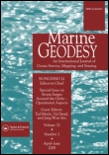
MARINE GEODESY
Scope & Guideline
Navigating the Intersection of Oceanography and Geospatial Science
Introduction
Aims and Scopes
- Marine Geodesy and Navigation:
Research on the application of geodetic techniques such as GNSS (Global Navigation Satellite System) for precise navigation and positioning in marine environments. - Bathymetric Mapping and Analysis:
Studies focused on the development of methodologies for bathymetric mapping using remote sensing, satellite data, and machine learning to improve underwater topography understanding. - Coastal and Ocean Dynamics:
Investigations into coastal processes, including shoreline changes, erosion-accretion patterns, and the impacts of climate change on marine environments. - Underwater Acoustics and Sonar Technologies:
Research involving the use of sonar and underwater acoustic technologies for various applications including mapping, object detection, and environmental monitoring. - Environmental Monitoring and Assessment:
Studies assessing the impacts of human activity and climate change on marine ecosystems and water quality using geodetic and remote sensing techniques. - Integration of Geophysical Data:
Research integrating geophysical data such as gravity anomalies and seismic measurements to enhance our understanding of marine geodesy.
Trending and Emerging
- Machine Learning Applications in Marine Sciences:
There is a significant rise in studies utilizing machine learning techniques for underwater data analysis, including ship detection, bathymetry estimation, and environmental monitoring. - Advanced Remote Sensing Techniques:
Recent publications highlight an increased focus on the use of advanced remote sensing techniques, including multispectral and hyperspectral imaging for bathymetric mapping and environmental assessments. - Climate Change Impact Studies:
Research addressing the impacts of climate change on marine environments, particularly regarding sea-level rise and coastal vulnerability, has gained prominence in recent publications. - Integration of GNSS with Other Technologies:
The integration of GNSS with other technologies, such as UAVs (Unmanned Aerial Vehicles) and IMU (Inertial Measurement Units), for enhanced marine navigation and monitoring is increasingly prevalent. - Coastal Geodesy and Management:
An emerging focus on coastal geodesy, emphasizing the need for precise measurements to inform coastal management and policy-making in response to environmental changes.
Declining or Waning
- Traditional Hydrographic Survey Techniques:
There is a noticeable decrease in papers focusing solely on traditional hydrographic survey methods as the field shifts towards more innovative approaches involving remote sensing and machine learning. - Static Geodetic Models:
Research on static geodetic models is becoming less common, with a growing preference for dynamic models that incorporate real-time data and adaptability to changing marine conditions. - Generalized Environmental Impact Studies:
The trend towards more specific and quantitative studies has reduced the publication of broad environmental impact assessments, which often lack the precision and detail seen in newer research.
Similar Journals
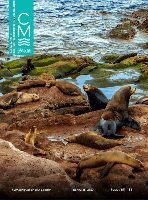
CIENCIAS MARINAS
Connecting Scholars to the Ocean's SecretsCIENCIAS MARINAS, an influential journal in the field of Aquatic Sciences, is published by the Instituto de Investigaciones Oceanológicas of the Universidad Autónoma de Baja California. Established as an open access platform since 2006, it aims to disseminate original research and critical reviews that contribute to the advancement of marine science. With a commitment to fostering scholarly dialogue, CIENCIAS MARINAS serves as a vital resource for academics, researchers, and practitioners interested in the ecological dynamics and biological processes of aquatic environments. Although currently ranked in the fourth quartile in Aquatic Science by Scopus, the journal remains dedicated to increasing its visibility and impact within the research community. Housed in Mexico, it offers a regional perspective that underscores the importance of coastal and oceanic research, making it an essential avenue for exploring marine biodiversity and conservation efforts. By engaging with this journal, readers can stay abreast of the latest developments and contribute to the growing body of knowledge in marine sciences.

Indian Journal of Geo-Marine Sciences
Advancing Research in Oceanic and Geological FrontiersThe Indian Journal of Geo-Marine Sciences, published by the NATIONAL INSTITUTE OF SCIENCE COMMUNICATION & INFORMATICS (NISCAIR), serves as a vital platform dedicated to the dissemination and advancement of knowledge in the field of marine and geosciences. As an open-access journal, it allows for improved visibility and accessibility of research findings to a global audience, enabling researchers, professionals, and students to share insights into oceanography and related disciplines. With a publication history spanning from 2007 to 2010 and continuing from 2012 to 2024, it has established itself within the academic community as a reliable source of innovative research, despite being classified in Q4 of Oceanography and holding a Scopus rank that places it in the 27th percentile. This journal is particularly relevant for those investigating marine ecosystems, geological oceanography, and their interconnections, thus playing an essential role in fostering understanding and communication within this important area of scientific inquiry.
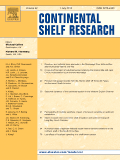
CONTINENTAL SHELF RESEARCH
Shaping the Future of Oceanographic ResearchCONTINENTAL SHELF RESEARCH, published by PERGAMON-ELSEVIER SCIENCE LTD, is an esteemed journal within the fields of Aquatic Science, Geology, and Oceanography, reflecting a compelling intersection of these disciplines. Since its inception in 1982, this journal has served as a premier platform for disseminating cutting-edge research relevant to the continental shelf ecosystem, including its geological features, biological resources, and physical processes. With a Category Quartile ranking of Q1 in Aquatic Science and prominent Q2 standings in Geology and Oceanography, it is recognized for its rigorous peer-review standards and impactful contributions, evidenced by its respective rankings in Scopus. Researchers and professionals are encouraged to engage with the journal's array of high-quality articles that not only enhance scientific understanding but also inform policy and conservation efforts. This dedication to advancing knowledge makes CONTINENTAL SHELF RESEARCH an essential resource for those passionate about marine and coastal studies in the United Kingdom and globally.
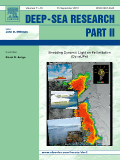
DEEP-SEA RESEARCH PART II-TOPICAL STUDIES IN OCEANOGRAPHY
Diving Deep into Oceanographic DiscoveriesDEEP-SEA RESEARCH PART II-TOPICAL STUDIES IN OCEANOGRAPHY is a leading journal in the field of oceanography, published by PERGAMON-ELSEVIER SCIENCE LTD. With an impressive ranking of Q1 in Oceanography and holding the 20th position out of 145 journals in the Earth and Planetary Sciences category, this journal provides a prominent platform for researchers and practitioners alike. Covering topical studies in oceanography since its inception in 1993, it continues to contribute significant insights into deep-sea research, enhancing our understanding of marine environments. Although the journal does not presently offer Open Access options, it remains a vital resource, appealing to students and professionals who seek to engage with innovative research and practical applications in the oceanographic community. The journal's ongoing commitment to excellence is evident as it plays a crucial role in advancing the field leading up to the present day and beyond.

MARINE GEOPHYSICAL RESEARCH
Pioneering research in marine geophysical phenomena.MARINE GEOPHYSICAL RESEARCH is a prominent journal published by Springer, dedicated to advancing the field of marine geophysics, with significant contributions to geochemistry, petrology, and oceanography. Established in 1970 and currently running its volumes until 2024, this journal operates as a key resource for researchers and professionals focused on understanding the complexities of marine environments and geological processes. With a strong foothold in academic rankings—positioned in Q2 for both Geophysics and Oceanography, and Q3 for Geochemistry and Petrology in the 2023 category quartiles—MARINE GEOPHYSICAL RESEARCH provides a rigorous platform for high-quality research dissemination. Although not an open-access journal, it offers invaluable insights into marine geophysical phenomena, thus appealing to a diverse audience of scholars and practitioners. The journal’s relevance and impact are further underscored by its Scopus ranks, situating it competitively within the Earth and Planetary Sciences domain. Researchers and students seeking to stay abreast of cutting-edge developments and methodologies in marine geophysics will find it an essential addition to their academic resources.

Ocean Science Journal
Transforming Ocean Insights into ActionOcean Science Journal, published by the Korea Institute of Ocean Science and Technology (KIOST), is a pivotal resource for scholars and practitioners in the field of oceanography. With the ISSN 1738-5261 and E-ISSN 2005-7172, this journal presents cutting-edge research from 2006 to 2024, bridging fundamental and applied ocean sciences. Based in South Korea, with its headquarters located in Busan, the journal has achieved a commendable Scopus rank of #72 out of 145 in the domain of Earth and Planetary Sciences, placing it in the 50th percentile among peer publications. Classified in the Q3 category of the 2023 Oceanography rankings, Ocean Science Journal offers a platform for innovative studies that advance understanding of marine environments and promote sustainable ocean practices. While it does not operate under an open access model, readers and contributors can expect high-quality, peer-reviewed material that addresses pressing oceanic challenges and developments. This journal serves as an essential tool for researchers, professionals, and students committed to fostering marine science and ocean technology.

TELLUS SERIES A-DYNAMIC METEOROLOGY AND OCEANOGRAPHY
Elevating Understanding of Dynamic Earth SystemsTELLUS SERIES A-DYNAMIC METEOROLOGY AND OCEANOGRAPHY, published by Stockholm University Press, is a prestigious open-access journal that has been at the forefront of research in the fields of atmospheric science and oceanography since its inception in 1983. With an enduring commitment to disseminating high-quality, peer-reviewed research, the journal has achieved a commendable impact factor, securing its position in the Q2 category for both Atmospheric Science and Oceanography as of 2023. The journal's significant reach is reflected in its Scopus rankings, being positioned at Rank #51 in Oceanography and Rank #77 in Atmospheric Science. With open access established since 2012, TELLUS SERIES A serves not only as a vital resource for researchers and professionals in these dynamic fields but also as an inclusive platform for budding scholars and students. Engaging with this journal allows readers to stay updated on the latest developments and groundbreaking discoveries that advance our understanding of climate systems and marine environments. Its editorial ethos emphasizes the cross-disciplinary integration of atmospheric and oceanographic studies, making it an essential publication for anyone invested in environmental research and policy.

Journal of Ocean University of China
Charting the Course for Marine Science ExcellenceThe Journal of Ocean University of China, ISSN 1672-5182, is a premier academic journal dedicated to advancing the fields of Ocean Engineering and Oceanography. Published by the esteemed Ocean University of China, the journal serves as a vital platform for researchers, professionals, and students to disseminate groundbreaking findings and foster collaboration in marine science and engineering. With a commitment to quality, the journal currently holds a Q3 ranking in both Ocean Engineering and Oceanography as of 2023, indicating its significant contributions within the scientific community. The journal's scope encompasses a wide range of topics including marine technology, ecological studies, and coastal management, all aimed at enhancing the understanding and utilization of oceanic resources. Although currently not Open Access, it continues to attract submissions from renowned scholars, ensuring a diverse and innovative range of research. By providing access to cutting-edge research and practical insights, the Journal of Ocean University of China plays a critical role in shaping the future of ocean sciences and engineering.

STUDIA GEOPHYSICA ET GEODAETICA
Fostering Dialogue in the Heart of Earth Science ResearchSTUDIA GEOPHYSICA ET GEODAETICA, published by Springer, is a prestigious scientific journal that has been at the forefront of the fields of Geochemistry, Petrology, and Geophysics since its inception in 1957. With an ISSN of 0039-3169 and an E-ISSN of 1573-1626, the journal serves as a vital platform for disseminating original research and reviews that enhance our understanding of the Earth’s processes. Situated in the Netherlands, the journal is indexed in notable databases, holding a respectable Tier Q3 ranking in both Geochemistry and Petrology, as well as Geophysics, based on the 2023 metrics. With its commitment to academic rigor, the journal seeks to engage a diverse audience of researchers, professionals, and students, facilitating vital discourse and advancements in Earth sciences. Although it does not currently offer open access options, it remains a significant resource for those aiming to contribute to or further their knowledge within these critical disciplines.
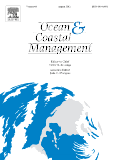
OCEAN & COASTAL MANAGEMENT
Fostering Sustainable Practices in Coastal EcosystemsOCEAN & COASTAL MANAGEMENT is a premier journal dedicated to the multifaceted fields of oceanography, aquatic science, and coastal management. Published by ELSEVIER SCI LTD and located in the United Kingdom, this esteemed journal boasts a remarkable Q1 ranking in prestigious categories, including Aquatic Science and Oceanography, reflecting its influential contributions to the field since its inception in 1992. The journal is recognized for its high impact, boasting a commendable presence in Scopus rankings across related disciplines, with notable placements in the 94th percentile for Aquatic Science and 92nd percentile for Oceanography. Although it operates under a subscription model, OCEAN & COASTAL MANAGEMENT continues to serve as a vital resource for researchers, professionals, and students seeking to advance their understanding of coastal ecosystems and effective management strategies. Through rigorous peer-reviewed research, the journal aims to foster knowledge exchange and practical applications in policy-making and environmental stewardship, making it an essential read for anyone engaged in the preservation and sustainable use of oceanic resources.